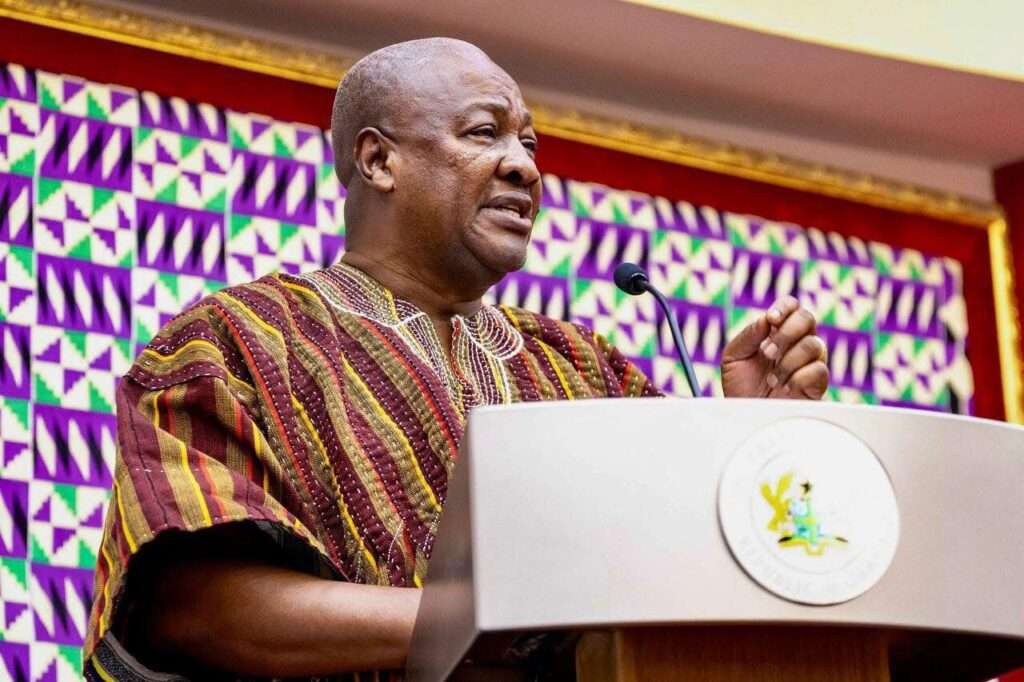Spokesperson for the presidency, Felix Ofosu Kwakye, has asserted that President John Mahama did not merely lament the poor state of Ghana’s economy during his State of the Nation Address (SONA) but outlined specific interventions aimed at restoring economic stability.
According to Ofosu Kwakye, the president’s speech addressed key economic challenges and presented concrete measures to tackle them across multiple sectors.
“So not only did the president meet the constitutional obligation, he actually inspired hope in those who were looking for something beyond just indicating what he came to meet.”
Felix Ofosu Kwakye, Spokesperson for the presidency
Ofosu Kwakye also criticized the previous administration’s economic management, insisting that the economic conditions inherited by the Mahama administration in 2025 were significantly worse than in 2016.
On a structural level, he noted that the prevailing economic hardships are evident and deeply felt, reinforcing the notion that the economy was fundamentally broken.
He pointed to the recent Domestic Debt Exchange Program (DDEP) as a prime example of misguided economic policies, describing it as one of the most damaging financial decisions in the country’s history.
“They took 1.3 million people through excruciating hassle by telling them that the money that they were expecting to receive from the government after having bought bonds was not going to come.”
Felix Ofosu Kwakye, Spokesperson for the presidency
He expressed concern that the agreed-upon interest rates were drastically reduced, and the maturity periods were significantly extended.
In his view, the debt restructuring program imposed a heavy financial burden on ordinary Ghanaians, further deepening their economic struggles. “This took 1.3 million people to hell.”
Key Economic Indicators

Furthermore, Felix Ofosu Kwakye asserted that, at a fundamental level, every Ghanaian can recognize the economic downturn since 2016.
He pointed out that the president deliberately avoided discussing key economic indicators during the SONA, likely due to their poor state.
According to him, there are approximately 18 major economic indicators, the majority of which have deteriorated under the previous administration. “If you take out the growth rates, all the rest are worse than what the NPP inherited from the NDC in 2017 when it took over the government.”
He further criticized claims that the previous administration had left behind a positive primary balance.
“They set a target of 0.5 percent, which is supposed to be a surplus. You need to know what the primary balance is. It is simply, crudely speaking, your deficits minus interest payments because that is statutory.”
Felix Ofosu Kwakye, Spokesperson for the presidency
According to him, the previous government had exceeded its projected deficit margins significantly, further weakening the economy.
“It is not true that they left a surplus. They left a negative, far worse than what they projected.
“Some say nobody put a gun to their head to project that they will get 18 percent inflation at the end of 2024.”
Felix Ofosu Kwakye, Spokesperson for the presidency
The economic downturn, he said, is evident in the inflation rate, which reached 23 percent—far worse than projections.
On the issue of debt, Ofosu Kwakye pointed out that when the NPP took over in 2017, Ghana’s public debt stood at GHS120 billion. However, by the time they left office in 2024, it had ballooned to GHS721 billion.
“Even then, it was because we had some debts written off recently after the domestic debt exchange.
“They had to supplicate before our lenders to let go of our GHS2.8 billion in debt.”
Felix Ofosu Kwakye, Spokesperson for the presidency
He further emphasized how the debt-to-GDP ratio had worsened over the years. “Debt to GDP ratio, we left 55.6. Two years ago, it was 104 percent”
He pointed out that despite recent declines, the debt-to-GDP ratio remains above 70 percent, far exceeding acceptable limits.
He criticized comparisons to countries with debt-to-GDP ratios ranging from 20 to 80 percent, noting that those nations often borrow at interest rates as low as 0.5 percent, whereas Ghana borrows at much higher rates, around nine percent.
The real concern, he emphasized, is not just the debt level but the country’s ability to repay.
He argued that the government’s inability to meet its obligations was evident, which is why it compelled bondholders to forfeit approximately GHS240 billion under the domestic debt exchange program.
Ofosu Kwakye stressed that the previous government’s mismanagement of the economy had dire consequences for Ghanaians.
“You have gone to extend our lenders to ask them to take a haircut because you cannot pay your debt.
“At the time you took over in 2016, we could pay our debts and still have some to deal with domestic problems. You could not pay for it.”
Felix Ofosu Kwakye, Spokesperson for the presidency
He described the previous government’s attempt to portray the economy as improving as a deliberate attempt to mislead Ghanaians.
“So how does anybody look at this economy and tell you that it is better than what they inherited?
“That is dishonesty, and you see, it is one thing to have mismanaged the economy, but to gaslight people, look in the face of Ghanaians, and tell them things that they know to be untrue, is to add insult to injury. It is little wonder that you suffered the electoral defeat that you suffered.”
Felix Ofosu Kwakye, Spokesperson for the presidency
Accordingly, he emphasized that Ghanaians have already delivered their verdict on the economy through the ballot box.
He asserted that the election results reflect the people’s judgment on the country’s economic trajectory, making it clear where they stand on the matter.
According to him, no amount of political rhetoric can override the reality that citizens experience daily, as their votes are a direct expression of their dissatisfaction and desire for change.
READ ALSO: Zelenskyy Expresses Gratitude To US



















